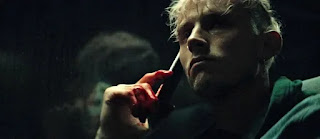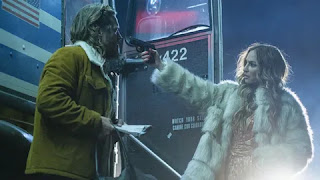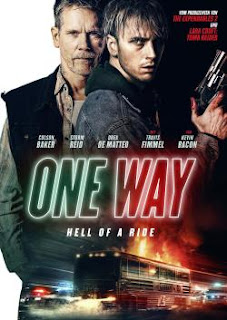"The needle to the last, eh, Holmes?"
Without doubt, one of the worst of all the Universal Holmes films. The fourth film in the 14 film series — assuming you count the first two 19th-century-set 20th Century Fox productions, The Hound of the Baskervilles (1939 / trailer) and The Adventures of Sherlock Holmes (1939 / trailer), and not just the subsequent 12 films set in the 20th century made by Universal once they gained control of the characters — almost everyone involved in the project does such a lackluster turn that one could easily believe that The Secret Weapon was one of the last of the series, made when all those involved had run out of steam.
Trailer to
Sherlock Holmes and the Secret Weapon:
True, both Nigel Bruce (14 Feb 1895 – 8 Oct 1953) and Basil Rathbone ([13 Jun 1892 – 21 Jul 1967] of Voyage to a Prehistoric Planet [1965]) do a mildly competent turn, but unlike in such films as The Scarlet Claw (1944 / trailer) or The Spider Woman (1944 / trailer), or even the earlier entry The Voice of Terror (1942), there doesn't seem to be any spark between them, and they often seem on automatic pilot.
Likewise, in his first outing in the series he was thereafter forever to helm, Roy William Neill (4 Sept 1887 – 14 Dec 1946) displays little of the directorial talent that has since earned him delayed respect as a precursor of film noir. Here, his careful staging, lighting and composition are oddly lifeless and sleep-inducing, displaying all the care and creativity of a Poverty Row hack director, not one of Hollywood's practiced stalwarts. The B&W photography of the movie is as equally undistinguished as the direction, seemingly consisting of nothing more than a few shades of washed-out gray — but then, the version of The Secret Weapon we screened was one of the un-restored, public domain versions, so perhaps the disappointing cinematography can be blamed on the degraded quality of the film copy itself.
Still, considering how creative and narratively interesting some of the later entries of the series are, this early entry in the low-budget series has all the life of an assembly line job in which neither creativity nor motivation was required: The Secret Weapon feels very much like a bad excuse to keep a number of actors employed while simultaneously filling the studios bank account with the proceeds generated by a guaranteed audience. That said, as we pointed out in our review of the preceding film of the franchise, The Voice of Terror (1942), "like so many classic programmers and low budget Universal movies, all of the Rathbone/Bruce movies exude that special something that makes them eternally watchable and fun despite their often glaring flaws, especially if you're a fan of old movies and you're watching the restored versions." (Just expect less watchability and fun than found in some of the other Rathbone/Bruce programmers.)
Like The Secret Weapon, the previous, roughly five-month earlier entry, The Secret Weapon is a wartime effort and more than slightly propagandistic; indeed, this piece of celluloid presents Holmes (Rathbone) less as a brilliant detective than as some sort of loyal English spy. Undoubtedly, those who watched the movie back in 1942 knew, deep in their hearts, that Great Britain would never fall to the nasty Nazis as long as they had intrepid, loyal countrymen like Sherlock Holmes at their side...
Credited as based on the Sir Arthur Conan Doyle's short story The Adventure of the Dancing Men, the "adaptation" as provided by W. Scott Darling* (28 May 1898 – 29 Oct 1951), Edward T. Lowe Jr** (29 Jun 1890 – 17 Apr 1973) and Edmund L. Hartmann*** (24 Sept. 1911 – 28 Nov 2003) retains little from that tale other than a letter written in a "dancing-man" code.
* Canada-born William Scott Darling began his Hollywood career as the writer on what is thought to be the longest-lasting adventure serial ever, The Hazards of Helen (119 twelve-minute [mostly now lost] episodes between 1914 and 1917, each an individual and closed 12-minute melodrama and not ending on a cliffhanger). His subsequent career includes a stint directing silents, but he remained primarily a scriptwriter — for example, he worked on The Spider (1945 / full movie), Weird Woman (1944 / trailer) and The Ghost of Frankenstein (1942 / trailer). "He gradually gained a reputation as something of an extremely prolific hack screenwriter. By the 1940s he was largely employed by Universal and today is blamed by film buffs for scripting several of the worst Laurel and Hardy features." In 1951, while in the midst of divorcing his second wife Eleanor Fried (9 Jun 1891 – 14 Oct 1965) — she filed, not he — Darling parked his car at the beach, left the keys in the ignition, and went for a fully-clothed swim, whence he never returned. His wallet was found floating before he was...
** After directing his first and only movie, a possibly lost short titled The Losing Game (1915), Lowe turned to writing and worked on some 130-plus movies between 1913 and 1947, mostly programmers, including The Vampire Bat (1933) and The House of Frankenstein (1945), not to mention the original 1923 version of The Hunchback of Notre Dame (full film).
*** Hartmann possibly achieved greatest respectability (and the most money) as the producer of TV shows — My Three Sons (1962-72), anyone? — but we here at a wasted life respect him for his work on Ali Baba and the Forty Thieves (1943 / trailer, with Turhan Bey), Black Friday (1940 / trailer) and William Beaudine's The Face of Marble (1946 / full film).
* Canada-born William Scott Darling began his Hollywood career as the writer on what is thought to be the longest-lasting adventure serial ever, The Hazards of Helen (119 twelve-minute [mostly now lost] episodes between 1914 and 1917, each an individual and closed 12-minute melodrama and not ending on a cliffhanger). His subsequent career includes a stint directing silents, but he remained primarily a scriptwriter — for example, he worked on The Spider (1945 / full movie), Weird Woman (1944 / trailer) and The Ghost of Frankenstein (1942 / trailer). "He gradually gained a reputation as something of an extremely prolific hack screenwriter. By the 1940s he was largely employed by Universal and today is blamed by film buffs for scripting several of the worst Laurel and Hardy features." In 1951, while in the midst of divorcing his second wife Eleanor Fried (9 Jun 1891 – 14 Oct 1965) — she filed, not he — Darling parked his car at the beach, left the keys in the ignition, and went for a fully-clothed swim, whence he never returned. His wallet was found floating before he was...
** After directing his first and only movie, a possibly lost short titled The Losing Game (1915), Lowe turned to writing and worked on some 130-plus movies between 1913 and 1947, mostly programmers, including The Vampire Bat (1933) and The House of Frankenstein (1945), not to mention the original 1923 version of The Hunchback of Notre Dame (full film).
*** Hartmann possibly achieved greatest respectability (and the most money) as the producer of TV shows — My Three Sons (1962-72), anyone? — but we here at a wasted life respect him for his work on Ali Baba and the Forty Thieves (1943 / trailer, with Turhan Bey), Black Friday (1940 / trailer) and William Beaudine's The Face of Marble (1946 / full film).
The Secret Weapon opens with Sherlock Holmes in (an unconvincing) Switzerland using his ability at disguise to hoodwink some Nazi spies who are out to kidnap a local scientist, Dr. Tobel (William Post, Jr. [19 Feb 1901 – 26 Sept 1989]), the inventor of a revolutionary aiming devise for airplane bombers. Holmes even uses their automobile to help smuggle the good doctor out of the country and into England, where the man just happens to have a girlfriend, Charlotte Eberli (played by Kaaren Verne* [6 Apr 1918 – 23 Dec 1967]), who does little in the film other than to look interested in what other people have to say. Of course, Tobel soon disappears, having walked into the clutches of the evil Dr. Moriarty (Lionel "Pinky" Atwill of The Vampire Bat [1933], House of Frankenstein [1944] and so much more), who wants the Secret Weapon for the Nazis, who are willing to pay him a lot of money for it. Soon three of the four scientists that Tobel contracted to build the separate parts of the single weapon are all dead and it is up to Holmes to decipher Tobel's last encoded message and find out who the fourth scientist is — it's Professor Frederick Hoffner (an uncredited Henry Victor [2 Oct 1892 – 15 Mar 1945] of Freaks [1932 / Violet & Daisy] and King of the Zombies [1941 / trailer]) — before Moriarty does...
* Kaaren/Karen Verne, born Ingeborg Greta Katerina Marie-Rose Klinckerfuss in Berlin, fled Nazi Germany in 1938. The second of her three (possibly four) marriages was to Peter Lorre (26 Jun 1904 – 23 Mar 1964), whom she met while filming All through the Night (1942 / trailer); during their turbulent five years together they had a son and she tried to commit suicide several times. After their divorce, her career slowly petered out and many of her appearance were short and uncredited (for example, as a stewardess in The Torn Curtain [1966 / trailer]). The cause of her death appears to be contentious: some sources say she died of a heart ailment, others that she finally succeeded at killing herself.
* Kaaren/Karen Verne, born Ingeborg Greta Katerina Marie-Rose Klinckerfuss in Berlin, fled Nazi Germany in 1938. The second of her three (possibly four) marriages was to Peter Lorre (26 Jun 1904 – 23 Mar 1964), whom she met while filming All through the Night (1942 / trailer); during their turbulent five years together they had a son and she tried to commit suicide several times. After their divorce, her career slowly petered out and many of her appearance were short and uncredited (for example, as a stewardess in The Torn Curtain [1966 / trailer]). The cause of her death appears to be contentious: some sources say she died of a heart ailment, others that she finally succeeded at killing herself.
The Secret Weapon features the debut of Dennis Hoey ([30 Mar 1893 – 25 Jul 1960] of Frankenstein Meets the Wolf Man [1943 / trailer] and She-Wolf of London [1946 / trailer]) as Inspector Lestrade, the Scotland Yard detective. His character was to rival Watson as the comic relief in a total of six of the franchise movies, and here, stumbling along three steps behind Holmes but abreast with Dr. Watson, his affable if somewhat dense character is extremely likeable.
The movie also features the return to the series of Lionel "Pinky" Atwill (1 Mar 1885 – 22 Apr 1946) as Dr. Moriarty — he played a Dr Mortimor in The Hound of the Baskervilles (1939 / trailer) — and his pleasingly evil baritone and perfect diction are, as always, a pleasure.* Both he and Hoey are among the true highlights of this otherwise lackluster film — still, despite Hoey's Lestrade and Atwill's Moriarty, and contrary to popular wisdom, there are indeed lousy Sherlock Holmes films, and The Secret Weapon is one of them. While it might not need to be avoided, it is perhaps not the one to watch if you are new to the series, as it could well put you off to watching more of them. Which would be a shame, for on the whole the Rathbone/Bruce series is immensely entertaining on numerous levels.
* According to Hollywood scandal historians, including the ubiquitous Kenneth Anger (3 Feb 1927 – 11 May 2003), by the time Atwill appeared in The Secret Weapon, he was doomed to substandard and B films because of the situation he found himself in at the time: after two years of continuous court cases related to a sex scandal, Atwill had just pleaded guilty to charges of perjury in a deal with the city prosecutor that called for the dropping of all moral charges resulting from one of his infamous bacchanalian parties. (Let's hear it for sado-masochism, cross-dressing, and group sex!) Placed on five-year probation on 15 October 1942, Atwill faced an unofficial blacklisting from the studios bending to an unwritten rule of the Hays Office which stipulated that neither criminals nor probated persons could be employed. After seven months of unemployment, Atwill managed to get his probation annulled and returned to gainful employment, but now only amongst the B studios and in second rate serials, slowly sinking into Poverty Row obscurity. A nicely scandalous story, but here at a wasted life we might argue that Atwill was primarily a B-movie staple in the first place, his excursions into A films more the exception than rule, and he also managed to make a lot of movies during the period he was supposedly unemployable — the scandal served less to ruin Atwill's career than simply magnify a slide already underway.
* According to Hollywood scandal historians, including the ubiquitous Kenneth Anger (3 Feb 1927 – 11 May 2003), by the time Atwill appeared in The Secret Weapon, he was doomed to substandard and B films because of the situation he found himself in at the time: after two years of continuous court cases related to a sex scandal, Atwill had just pleaded guilty to charges of perjury in a deal with the city prosecutor that called for the dropping of all moral charges resulting from one of his infamous bacchanalian parties. (Let's hear it for sado-masochism, cross-dressing, and group sex!) Placed on five-year probation on 15 October 1942, Atwill faced an unofficial blacklisting from the studios bending to an unwritten rule of the Hays Office which stipulated that neither criminals nor probated persons could be employed. After seven months of unemployment, Atwill managed to get his probation annulled and returned to gainful employment, but now only amongst the B studios and in second rate serials, slowly sinking into Poverty Row obscurity. A nicely scandalous story, but here at a wasted life we might argue that Atwill was primarily a B-movie staple in the first place, his excursions into A films more the exception than rule, and he also managed to make a lot of movies during the period he was supposedly unemployable — the scandal served less to ruin Atwill's career than simply magnify a slide already underway.
Sherlock Holmes & The Secret Weapon —
full movie:


























%20Lord%20Mustard_1963_87_d-001.jpg)














